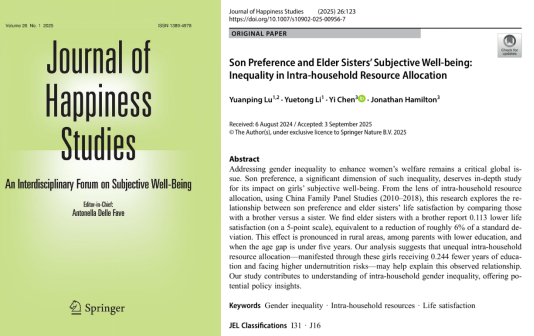Recently, a paper titled “Son Preference and Elder Sisters’ Subjective Well-being: Inequality in Intra-household Resource Allocation”, co-authored by Professor Lu Yuanping, Executive Director of the Center for International Cooperation and Disciplinary Innovation of Income Distribution and Public Finance at Zhongnan University of Economics and Law (ZUEL), doctoral candidate Li Yuetong, and their collaborators, was published in the Journal of Happiness Studies, a leading journal in happiness economics.

Highlights
From the perspectives of resource deprivation and gender inequality, this research offers a profound examination of how intra-household allocation disparities shape female welfare, providing an important theoretical contribution to understanding the welfare consequences of non-monetary resource allocation. Using data from the China Family Panel Studies (2010–2018), the research compares the life satisfaction of elder sisters by comparing those with a brother versus a sister to systematically examine the impact of son preference on girls’ subjective well-being. The research finds that elder sisters with a brother report 0.113 lower life satisfaction (on a 5-point scale) . Mechanism analysis highlights the critical role of intra-household inequality: those with a brother receive on average 0.244 fewer years of education and face higher risks of undernutrition, indicating that deprivation in educational and health resources constitutes a core pathway affecting their subjective well-being. This effect is pronounced in rural areas, among parents with lower education, and when the age gap is under five years. The research suggests that promoting equitable distribution of educational resources, strengthening public investment in nutrition and health, and advancing the equalization of elderly support and medical services are effective ways to alleviate the long-term negative impact of intra-household inequality on women’s welfare.
About the Author
Lu Yuanping is a Wenlan Distinguished Professor, Doctoral Supervisor, Dean of the School of Public Finance and Taxation, and Executive Director of the Center for International Cooperation and Disciplinary Innovation of Income Distribution and Public Finance supported by the Ministry of Education and the Ministry of Human Resources and Social Security at ZUEL. Professor Lu is a Young Top-notch Talent of the National Talent Program and a Young Top-notch Talent in Hubei Province. He serves as a member of ZUEL's academic committee, executive director of the China Association of Labor Economics and the Hubei Population Association, and an expert in the Social Security Talent Pool of the Ministry of Finance. Professor Lu studies income distribution, social security, fiscal taxation policy, happiness economics, etc. He has presided over 20 national, provincial, and ministerial projects, including major projects of the National Social Science Fund of China, general programs and young scientists fund projects of the National Natural Science Foundation of China, projects supported by the Humanities and Social Sciences Fund of the Ministry of Education, and the ministry-provincial cooperation projects of the Ministry of Finance. His research results have been published in journals such as Economic Research Journal, Journal of Management World, China Economic Quarterly, Journal of Financial Research, Chinese Rural Economy, Finance & Trade Economics, Economic Perspectives, Cities, Journal of Happiness Studies, China & World Economy, and The Social Science Journal. He is an anonymous reviewer for journals such as Economic Research Journal, Journal of Management World, China Economic Quarterly, China Industrial Economics, Journal of Financial Research, Finance & Trade Economics, Journal of Happiness Studies, and China Economic Review, and a communication review expert of the National Natural Science Foundation of China.
